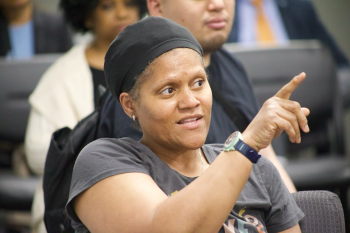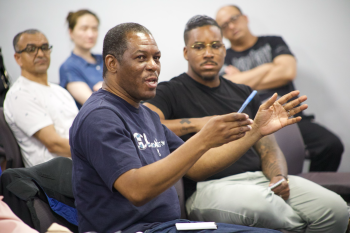A Letter from HTC President Rich Maroko: New Trainings for Union Delegates

June 4, 2024 5:53 PM
It is not enough to have the best hospitality contract in the world – if the terms of that contract aren’t enforced, it’s not worth the paper it’s written on. Over the last 18 months, we have been working on several major initiatives to make our Union even stronger at contract enforcement. The plan includes hiring more business agents, using artificial intelligence to catch more violations, introducing new technology to ensure grievances are effectively and efficiently processed, reinstituting a grievance officer to shepherd cases through the process, speeding up the arbitration procedures, and providing new trainings for the first line of contract enforcement: our union delegates.
I’ll be sharing more details on these ongoing efforts soon – but today, I’m excited to announce the launch of our delegate training program. This new curriculum will give our delegates more knowledge and tools to use in their next grievance meetings and the opportunity to learn the nuts and bolts of our contracts, the grievance and arbitration process, and the law.
Why contract enforcement matters
Our members have the best hotel jobs in the world. That’s because our master contract requires the highest wages and best benefits of any other hospitality contract out there – with free family medical, a pension, $38 an hour for most housekeeping staff, and extensive rights on the job.
We know that hotels don’t agree to sign our contracts because they want to. If they could pay you less and treat you as disposable, they would. Look no further than the non-union hotels run by some of the same companies that we have under contract. One union operator pays housekeepers at his non-union hotel in Manhattan $18/hour – that’s less than half of what room attendants at his union hotels make. Another posts the schedule just 3 days ahead of time at their non-union hotel and even then, managers regularly change the schedule just hours before the workers’ shifts. Yet another is cutting the hours of their non-union housekeeping staff by bringing in workers from a subcontracting agency to do their jobs – something they could never do in their unionized properties.
We also know that the hotels don’t abide by our contracts unless we make them. It’s no surprise that if they don’t want to sign our contract in the first place, they will flout it if they can. If there were no union representatives to stop them, there’s no question management would cheat you out of pay, treat you like you were on-call, and cut your hours.

This is where our 5,500 union delegates come in.
Our delegates are the eyes and ears of the Union. On the ground in their workplace, they hear from their coworkers when they’re having problems and they see when management is up to no good. Our delegates are the first line of defense when it comes to catching violations, raising grievances to management, defending their fellow members, and working with their business agent to get to the bottom of issues. Over many decades, through everyday actions and grievance meetings, our delegates and officers have built the reputation of the Union as tough, unafraid, and vigilant.
A delegate’s job isn’t an easy one.
A delegate’s job requires confidence to speak up to your boss and compassion to help your coworkers during emotional moments like a termination meeting. It requires sacrifice, with many delegates putting in hours of effort to resolve grievances in their free time. And it requires determination. To get to the bottom of many grievances, it takes studying our contracts, the painstaking collection of evidence, documenting past practice, and learning how past arbitration cases and the law intersect with your case. Of course, there are professional business agents and lawyers who will guide the process, but finding and doing the groundwork is primarily the responsibility of the delegate.

Delegate Training Program:
Training 1: Union 101
The first training will focus on the delegate’s most fundamental responsibility: keeping the Union strong. Some members mistakenly believe that contract negotiations begin and end at the bargaining table. In reality, our Union prepares to fight for contracts years in advance. In this training, we talk about what our members and staff are doing to build our leverage ahead of contract fights, including the expiration of the IWA in just 2 years. Some of our strategies include running creative picket lines, building political power to pass targeted legislation that increases our ability to wage a fight with management, increasing our union density by strategically organizing non-union hotels, and negotiating master agreements instead of stand-alone contracts.
Trainings 2 and 3: Contract 101
The second and third trainings will go over the many rights and protections in our master contract, the Industry Wide Agreement (“IWA”). The language in the union contract can be divided into two overarching categories: language that gives our members more money (and by that, not just wages but also the cost of benefits, overtime, and paid time off); and language that gives our members more rights.
We’ll start with the issues that most often come up for delegates on the shop floor, like pay, overtime, scheduling, and seniority. We’ll also explore where our rights come from, beyond the black-and-white master contract language. Because it's not just the contract language that governs the conditions your workplace — it’s also the past practice at your shop, thousands of arbitration decisions that interpret the contract, and the law.
Training 4: Just Cause
The fourth training will go in depth about some of the most common cases handled by delegates: disciplinary actions. We'll talk about the legal components of "just cause" protection, analyze practical examples, and review other contract language that gets considered when a union worker is disciplined, suspended, or fired.
Training 5: Grievance & Arbitration
After reviewing what rights are in our master contract, we will focus on how to enforce it. We'll study the mechanics of our Union's unique grievance and arbitration process - from the moment a member raises a grievance with HR to the day we get a decision from the arbitrator's office.
Training 6: Protect our Union’s Power
While resolving grievances is the primary job of delegates – they are also expected to keep the union strong by helping the Union organize non-union hotel workers, showing up at union picket lines, and building our political power to pass targeted legislation. That’s the focus of the Protect our Union’s Power training.
Our Union puts more energy into contract enforcement than any other.
Nowhere else in the country do hotel workers have binders full of side agreements and extra pay and rights on top of what was negotiated in the contract. Nowhere else do hotel workers have their own arbitration system, access to emergency hearings, and steep penalties for companies that are caught willfully violating the contract. Nowhere else do professional union representatives have unrestricted access to the workplace 24/7.
Even still, there is more to be done. When our delegates are trained to be experts at enforcement, we can be sure that union members receive every penny, every hour of work, and every bit of dignity that they’re entitled to under the contract. The entire Union will be stronger for it.
I look forward to seeing many of you at these trainings.
In solidarity,
Rich Maroko
HTC President

Sign up for Delegate Trainings:
We’re looking for delegates to join the first classes this summer. You can enroll here.
Looking for training, but not a delegate?
Each month, the Union offers a two-hour introductory training on how our members can play their part in strengthening and protecting our Union. We cover everything from what it takes for non-union workers to organize to how we win contracts to how we build political power and use it at the bargaining table. You can sign up for the next training here.


